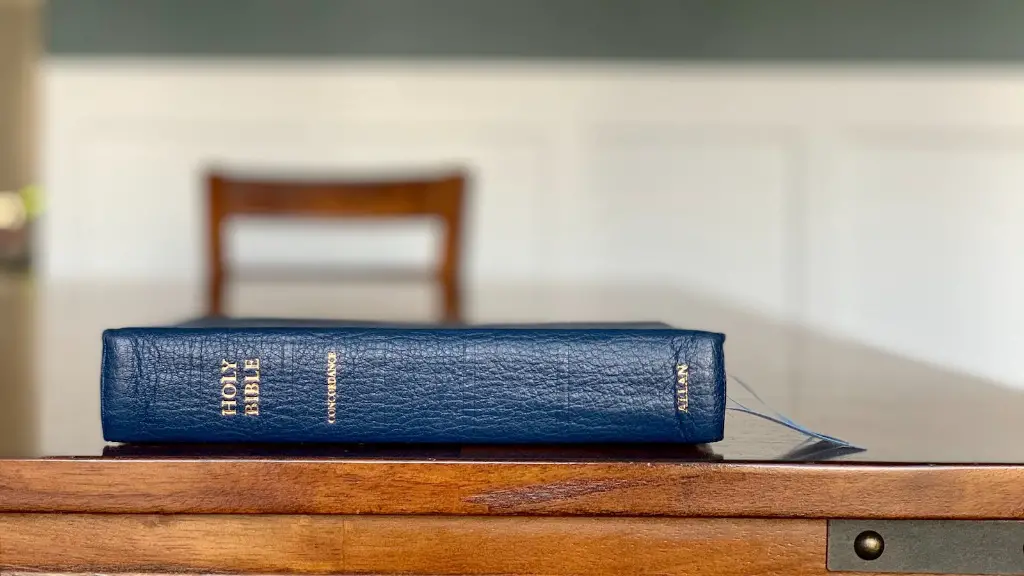What Does the Bible Say About Gays
The Bible is our cultural and spiritual history, providing guidance to millions of believers around the world. But much of the Bible’s teachings are open to interpretation. One of the areas where this is true is on the topic of homosexuality. While many view the Bible as condemning homosexuality, there is a great deal of debate on this point.
The Bible does refer to same-sex relationships between women and men in various passages, but there is a lack of clarity about what these references mean. One of the most often cited verses is Leviticus 18:22: “You shall not lie with a male as with a woman; it is an abomination.” While this is often interpreted as a condemnation of homosexuality, there is some debate about the meaning. Some scholars interpret the passage as a prohibition on ritual homosexual activity, while others interpret it as a prohibition on all male-male sexual relationships.
The New Testament also has passages that are often seen as condemning homosexuality. For example, Romans 1:26-27, says: “Because of this, God gave them over to shameful lusts. Even their women exchanged natural relations for unnatural ones. In the same way the men also abandoned natural relations with women and were inflamed with lust for one another. Men committed indecent acts with other men…” Again, there is debate about the meaning and implications of this verse. Some view it as an outright condemnation of homosexuality, while others interpret it as a warning against specific behavior.
Whether the Bible condemns or merely discourages homosexuality is a point of debate. Some argue that the Bible does not explicitly say that homosexuality is wrong or sinful, but merely forbids certain behaviors. Proponents of this interpretation point out that many verses in the Bible are not prohibitive, but rather offer a choice between two “good” and “bad” options. By this logic, homosexuality may be neither “good” nor “bad” in the eyes of the Bible.
Additionally, many experts point out that the Bible does not explicitly refer to modern-day homosexuality and same-sex marriage. The Bible was written in a different time, with different values and a different conception of sexuality. Therefore, some experts point out that it can be difficult to interpret its teachings with current-day values and morals.
Ultimately, the interpretation of the Bible’s teachings on homosexuality is a complex and often emotionally charged debate. While some Christians argue that the Bible is clear in its condemnation of same-sex relationships, others argue that the Bible does not explicitly advocate for or against such relationships. As with any topic, individual interpretation is key.
What About LGBT Spiritual Leaders?
In the US, religious communities have made strides towards inclusion and welcome of LGBT people. Within the evangelical Christian world, pro-LGBT organizations like The Reconciling Network push for greater acceptance of LGBT identities, while some denominations now ordain openly LGBT clergy. This creates a unique situation in which some churches could be considered “churches with a gay pastor”, This raises the question of whether accepting a gay pastor as part of a congregation is in line with traditional biblical teaching.
The traditional biblical interpretation of homosexuality is that it is a sin. So, for many Catholics and orthodox Christians, the presence of an openly gay pastor would go against their understanding of the Bible’s teachings. However, there are those who argue that the presence of an openly gay pastor does not need to imply a rejection of biblical morality. For example, some argue that LGBTQ people are still capable of honesty, integrity, and faithfulness, and that the presence of an openly LGBT pastor could help lead a congregation to a greater understanding of God’s love.
Ultimately, the decision of whether or not to ordain a gay pastor is a decision that should be made on a case by case basis, with each congregation’s individual values and beliefs taken into consideration. This is true both of Christian churches that adhere to traditional teachings regarding homosexuality and churches that have embraced more progressive interpretations.
LGBTQ Inclusion in Society
The issue of homosexuality is much broader than just the discussion within Christianity. Beyond debates about the morality and implications of homosexuality, there is also the issue of LGBT inclusion in society.
In many parts of the world, LGBT people face discrimination and even persecution. LGBT inclusion is a key part of the struggle for human rights, and greater acceptance of LGBT identities is an important step towards a more inclusive society.
In the US, strides have been made in recent years. The Supreme Court struck down bans on same-sex marriage in 2015, receiving mixed reactions from different parts of the population. Laws have also been passed in many states making it illegal to discriminate against LGBT people in employment and housing.
In other parts of the world, however, the situation is not so hopeful. In many countries, homosexuality is illegal, and LGBT people are subjected to discrimination and even violence.
Given the importance of LGBT rights and acceptance, it is encouraging to see movements working to change laws and attitudes and foster a more inclusive society. But at the same time, it is also important to remember that there is still more work to be done.
Other Religions & Their View on LGBT
The discussion of LGBT rights in religion is not limited to Christian faiths. Many other religions around the world have different views on the subject, either condemning it or accepting it.
In Islam, for example, the official stance is that homosexuality is a sin. However, there are Islamic scholars who argue that this position is not to be taken literally and that the important thing is for individuals to strive for a life of holiness. Muslim evangelists such as Yasir Qadhi have argued that there is no need to condemn same-sex relationships, and that the key is for people to search for the truth in their own beliefs about sexuality.
In Judaism, the views on homosexuality vary greatly among different denominations. Conservative and traditional sects generally reject homosexuality, while more liberal sects have embraced it. Reform Judaism, for example, has recognized same-sex marriages since 2000.
In Hinduism, there is a range of views on LGBT identities and issues. Many Hindu scriptures make references to same-sex relationships, and there is a diversity of opinion on the subject in the Hindu community.
LGBT Supportive Groups
Given the controversial nature of the LGBT rights discussion, it is no surprise that there are many organizations dedicated to supporting and advocating for LGBT people. These organizations strive to create a positive and safe space for LGBT people and their allies to come together and work for greater acceptance and inclusion.
One of the most well-known organizations is the Human Rights Campaign (HRC). The HRC is the largest LGBT civil rights organization in the US, and works to end discrimination and advance equality for LGBT individuals and families. The organization also has a series of anti-bullying initiatives, such as the Welcoming Schools Program, which works to create safe and supportive learning environments for all students.
There are also many local and regional organizations dedicated to LGBT rights. These organizations work to create safe spaces for LGBT people and advocate for their rights. They also provide support to individuals and families facing discrimination or other challenges.
LGBT Mental Health Support Groups
LGBT individuals and families experience unique challenges and struggles due to their minority status. As a result, many LGBT people face mental health issues related to their sexuality or gender expression. It is important for LGBT individuals and families to have access to mental health resources and support.
The Trevor Project is one such organization. This organization is devoted to providing support to LGBT youth in crisis through a variety of services, including crisis intervention, mental health services, and suicide prevention programs. The organization also works to end bullying and discrimination in schools.
The National Queer and Trans Therapists of Color Network is another important resource. This organization provides support and resources to Queer and Trans People of Color and their allies. Additionally, the organization engages in advocacy and works to end heterosexism, racism, and other forms of discrimination.
These organizations and others provide vital support to LGBT individuals and families, helping them to find the resources and support they need in order to cope with the struggles they face.





